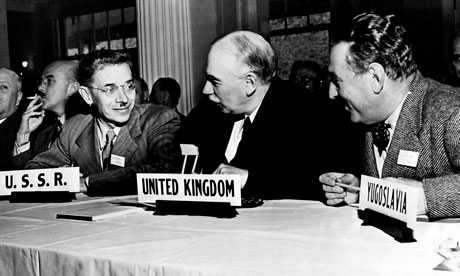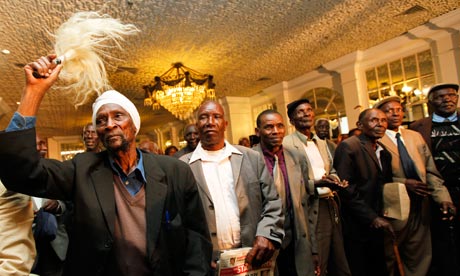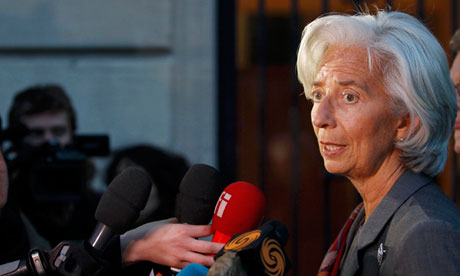If the 'obvious' failure of austerity is to make way for Keynesian policies, its advocates must confront their critics head on

British economist John Maynard Keynes, at the UN International Monetary Conference, circa 1946. Photograph: Hulton Archive
Keynes is out of favour. In his place are the austerians who mistakenly liken the finances of nation states to domestic budgets. Unfortunately the Keynesians have fallen into the trap of thinking that the case they make is incontrovertible. It would hardly matter, except that their failure to address legitimate concerns – not those of rightwing commentators or the super-rich, but of voters on middle and low incomes – has blunted their sound argument for a stimulus package and allowed austerians to make most of the running. The "obvious" failure of austerity, recent improved figures for the economy notwithstanding, has done little to derail its continued application by the UK, Brussels and to a lesser extent, the US Congress.
Why? Here are nine assumptions that trip the Keynesians up.
1. They think policymakers refuse to change course because they don't understand
Liberal academics believe in the power of argument. If only the other person were intelligent enough to understand, they would realise that Keynesian economics is the only way to view the world. Paul Krugman, the Princeton economist who heads the list of left-leaning thinkers challenging austerity, believes officials in Brussels have opted for austerity simply because they misunderstood its negative effect on growth. Yet officials and politicians in Brussels are well aware of Keynesian theory and the history of the 1930s. The German finance minister, Wolfgang Schäuble, is many things, but being a bit thick is not one of them.
2. They think that everyone agrees austerity is wrong headed
Dean Baker is a left-leaning US economist and regular contributor to the Guardian. He said in a recent article: "We allowed policy to be waylaid by a misplaced obsession with deficits. Now that everyone in the debate recognises this mistake, it is time to focus on getting the country working again." Everyone agrees? In fact, most polls show voters approve of austerity. They want governments to cut annual budget overspends. The governor of the Bank of England believes in austerity. Three eminent mainstream British economists told MPs on the all-party Treasury select committee last month that the government had struck the right balance between cuts and spending. Austerity is bang on the mark, they said.
3. They think Brussels and the IMF have changed their tune
The EU commission boss, José Manuel Barroso, made comments in April that were leapt on by everyone on the left. He said austerity had reached its limits. Liberals said to themselves: finally he understands. But he only meant that in some countries voters were unwilling to accept more salary and welfare spending cuts, not that he agreed with them. He still thinks austerity is the right medicine. Later, a Brussels official told the Reuters news agency that Barroso had "miscommunicated" and there was no alternative to austerity, even if the word was avoided.
4. They make out that a spending boost with borrowed money is risk-free
The risks need to be explained. It is quite possible for governments to spend and find that growth remains elusive. A two-decade long spree by the Japanese has taken borrowing to more than 240% of GDP without boosting growth. To some extent it depends what the money is spent on. For instance, a high-speed rail link built by foreign companies (HS2, anyone?) will create less benefit than an immediate maintenance budget boost for existing lines.
5. They think central banks can carry on printing money with no risk
Quantitative easing involves central banks using their own money to buy government bonds (effectively lending the government money). They mostly buy the bonds from banks, which then use the cash to lend to other institutions and possibly, at some point along the chain, to small businesses. No risk? Not really. First, the banks can hoard the money to satisfy regulators who believe they are unsafe. Second, they can lend it, but factor in huge profit margins and pay themselves massive bonuses as a reward. And the money can be used to invest in property, for an easy profit, bypassing manufacturers.
6. They think quantitative easing can be switched off and normality will return
Just three central banks – the Bank of England, the Fed and the Bank of Japan – have created more than £3tn of debt and the figure is rising all the time. The Federal Reserve is creating around £50bn a month and the Japanese have joined in. Can all this money be sold back to the private markets without spooking investors, most of which have bought bonds or shares on the basis of never-ending central bank support? Probably the bonds will never be sold, but held until they mature, or they could be slowly drip-fed back into the international money markets, but the risks should be discussed.
7. They argue that no one should fear inflation
UK inflation fell to 2.4% in April, but remains well above wage rises, which trail at 0.8%. That's a big cut in living standards. Any politician who says inflation at 5% is not a worry will be blown away on election night. But that is what plenty of Keynesian economists, including Krugman, advocate. They have sound reasons for being relaxed about inflation. Most countries are worried about falling prices. And a stimulus package that raises demand is worth the risk of a short-term rise in inflation, even in the UK. Yet fearful middle-class savers and workers suffering pay freezes have legitimate fears.
8. They argue that stock market and house price rises are benign
Krugman is chief propagandist for the "spend now, deal with structural problems later" brigade, which means he simply won't address the issue. The London stock market recently neared its all time high despite a backdrop of static growth across Europe. UK house prices in property hotspots are above their 2007 peak. Is there a danger that some economies, the UK included, are simply repeating the mistakes of the early 2000s and encouraging debt-fuelled spending on unproductive assets like property to make a quick buck? Nouriel Roubini, known as Dr Doom for his pessimistic outlook for western economies long before the 2007 crash, oscillates between the Krugman view and warning of asset bubbles that could become the next economic atomic bombs. There needs to be a closer inspection of asset bubbles.
9. They believe politicians can be trusted to spend stimulus funds in the best way
Liberal economists assume voters trust politicians to spend funds sensibly. Multibillion pound investments in rail, nuclear energy and housing are needed but only a minority of voters trust the public sector to make a good job of it. For the time being, there needs to be an acknowledgment that civil servants and politicians of all political colours failed to spot the crash and are therefore not as smart as people once thought.
Conclusion
Keynesian economics is a valid response to the UK's protracted economic depression. There are always risks, but there were always risks with austerity and it has pushed up borrowing by as much if not more than a Keynesian stimulus would have done. Far from re-establishing confidence and generating growth, the UK has grown by 1.1% in three years. And it has a worsening trade balance and higher debt levels. Unemployment failed to rise by as much as expected, but it could be even lower by now. Economic green shoots are appearing, but can vanish with an early frost, which is possible with banks still strapped for cash and reluctant to lend.
It's important, then, that Keynesians win the argument. But if they want to do so, they've got to face their critics head on, and deal with legitimate concerns about the approach.







